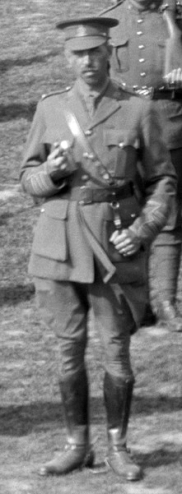Lieutenant Colonel C. F. Bick
37th (Northern Ontario) Battalion
His heart is intermitting. He is very nervous. There is a fine tremor over the entire body. Insomnia. He is easily startled by the slightest noise. He wakes up several times during the night.
(Proceedings of Medical Board, Exhibition Camp, 12 Apr 1917)
Born on 1 December 1866 in Berkeley, England, Charles Frederick Bick was a building contractor with thirty-four years’ experience in the Canadian militia. He immigrated to Canada at the age of four. Bick served for four years with the 10th Royal Grenadiers in Toronto before moving to Cannington in 1885. He joined the 34th Ontario Regiment as a private and rose through the ranks to become commanding officer in 1913.
In early 1915, Bick assumed command of the 37th Battalion, based in Sault Ste. Marie and recruited from northern Ontario. While awaiting deployment overseas in late 1915, Bick’s battalion participated in a training exercise to defend Toronto against a pretend “invasion from the north.” Marching for a week, the 37th traveled from St. Catherine’s to Hamilton before arriving at Exhibition Park to meet the imagined threat. The battalion sailed to England in early December 1915.
 Highlighting Bick’s long service in the militia, the Toronto Star observed:
Highlighting Bick’s long service in the militia, the Toronto Star observed:
Although he has never seen active service, he has the reputation of being one of the best soldiers in Canada and a worthy leader, whom the 37th boys have sworn to follow to the finish.
On 25 April 1916, the six-foot-one Bick proceeded to France on an instructional tour while attached to the 24th Battalion. Gassed at Zillebeke in mid-May, Bick was admitted to No. 2 Eastern General Hospital in Brighton. A medical board determined that he suffered from a nervous debility and DAH (Disordered Action of the Heart). The doctors granted him convalescence leave in Canada, concluding that the patient “has a sallow complexion and looks as if he should have considerable rest.” He took command of the 23rd Reserve Battalion and returned home in March 1917.
Continuing to exhibit nervous symptoms and irregular heart palpitations, Bick was officially discharged as medically unfit in January 1918. He served once more as commanding officer of the Ontario Regiment from 1920 to 1921.
In 1928, Bick became police magistrate for Ontario and Simcoe Counties. When forced into retirement at the mandatory age of seventy-five, he was one of the few remaining laymen judges. He disagreed with the new provincial policy requiring all magistrates to be lawyers, explaining, “good common sense is most needed. My military experience did much to teach me that.”
Bick died in Orillia on 26 January 1945.
Digitized Service File:
http://central.bac-lac.gc.ca/.item/?op=pdf&app=CEF&id=B0716-S002
For more on Bick’s Ontario Regiment: http://www.ontrmuseum.ca/